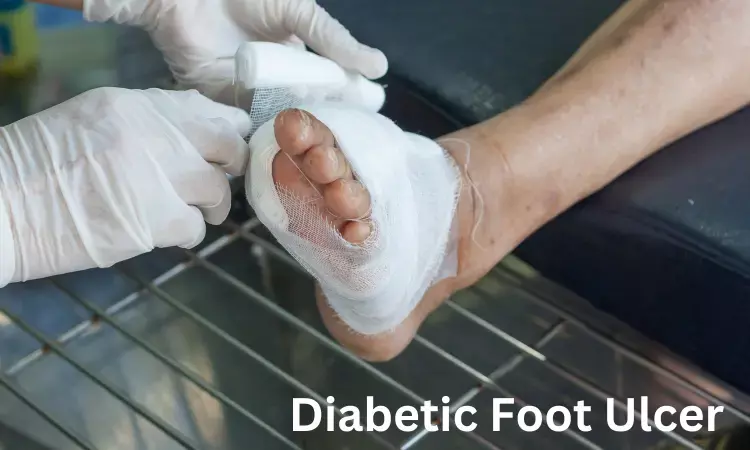- Home
- Medical news & Guidelines
- Anesthesiology
- Cardiology and CTVS
- Critical Care
- Dentistry
- Dermatology
- Diabetes and Endocrinology
- ENT
- Gastroenterology
- Medicine
- Nephrology
- Neurology
- Obstretics-Gynaecology
- Oncology
- Ophthalmology
- Orthopaedics
- Pediatrics-Neonatology
- Psychiatry
- Pulmonology
- Radiology
- Surgery
- Urology
- Laboratory Medicine
- Diet
- Nursing
- Paramedical
- Physiotherapy
- Health news
- Fact Check
- Bone Health Fact Check
- Brain Health Fact Check
- Cancer Related Fact Check
- Child Care Fact Check
- Dental and oral health fact check
- Diabetes and metabolic health fact check
- Diet and Nutrition Fact Check
- Eye and ENT Care Fact Check
- Fitness fact check
- Gut health fact check
- Heart health fact check
- Kidney health fact check
- Medical education fact check
- Men's health fact check
- Respiratory fact check
- Skin and hair care fact check
- Vaccine and Immunization fact check
- Women's health fact check
- AYUSH
- State News
- Andaman and Nicobar Islands
- Andhra Pradesh
- Arunachal Pradesh
- Assam
- Bihar
- Chandigarh
- Chattisgarh
- Dadra and Nagar Haveli
- Daman and Diu
- Delhi
- Goa
- Gujarat
- Haryana
- Himachal Pradesh
- Jammu & Kashmir
- Jharkhand
- Karnataka
- Kerala
- Ladakh
- Lakshadweep
- Madhya Pradesh
- Maharashtra
- Manipur
- Meghalaya
- Mizoram
- Nagaland
- Odisha
- Puducherry
- Punjab
- Rajasthan
- Sikkim
- Tamil Nadu
- Telangana
- Tripura
- Uttar Pradesh
- Uttrakhand
- West Bengal
- Medical Education
- Industry
Polyvascular Disease Worsens Outcomes in Diabetic Foot Ulcer Patients, Study Finds

Israel: A recent study published in the Journal of Diabetes and its Complications has drawn attention to the significant impact of polyvascular disease (PD) on clinical outcomes in patients hospitalized with diabetic foot ulcers (DFUs). The research, led by Dr. Nitzan Tal and colleagues from the Internal Medicine Section at Hadassah Hebrew University Hospital, Jerusalem, examined how the presence of atherosclerosis in multiple vascular territories affects recovery and survival.
"Patients with polyvascular disease hospitalized for diabetic foot ulcers had significantly poorer outcomes—higher in-hospital MACE or death (12.5% vs. 4.4%), more amputations (67.4% vs. 48.4%), increased 1-year mortality (33.0% vs. 12.1%), and shorter median survival (2.0 vs. 5.9 years)," the researchers reported.
The retrospective study reviewed data from 537 adult patients who were admitted to a dedicated diabetic foot unit between 2014 and 2019. Nearly half of these patients (264 individuals) were identified with PD, which involves simultaneous clinical involvement of at least two of the three major vascular beds—coronary, cerebrovascular, and peripheral arteries.
Based on the study, the researchers reported the following findings:
- 12.5% of patients with polyvascular disease (PD) experienced major adverse cardiovascular events (MACE) or death during hospitalization, compared to 4.4% of those without PD.
- 42% of PD patients underwent vascular procedures, in contrast to 19.4% of non-PD patients.
- Overall amputation rates were higher in PD patients (67.4%) than in those without PD (48.4%).
- Major amputations occurred in 35.6% of PD patients versus 13.2% in non-PD patients.
- The median hospital stay was 19 days for PD patients compared to 17 days for those without PD.
- The one-year mortality rate was 33.0% in the PD group, nearly three times higher than the 12.1% observed in non-PD patients.
- Median survival during a 3.3-year follow-up was significantly lower in PD patients (2.0 years) compared to those without PD (5.9 years).
These findings emphasize that DFUs in the setting of polyvascular disease should be viewed not merely as localized infections or wounds but as indicators of severe systemic vascular pathology. The authors emphasize the necessity of comprehensive cardiovascular risk management, recommending that patients with both DFU and PD be prioritized for guideline-based medical therapy and more aggressive inpatient and post-discharge care.
Given the high morbidity and mortality associated with this patient group, the study highlights an urgent need for clinicians to adopt a more integrated and proactive approach when treating patients with diabetic foot ulcers, especially those with established polyvascular disease.
"By addressing both the ulcer and the broader vascular health of the patient, healthcare providers may be able to improve not only immediate outcomes but also long-term survival for this high-risk population," the authors concluded.
Reference:
Tal, N., Hershkowitz, I., Gorin, K., Leibovitch, M., Peled, S., Olshtain-Pops, K., Lorber, J., Fisher-Negev, T., Tsur, A., Haze, A., Gellman, Y. N., & Cahn, A. (2025). Clinical outcomes of patients with Polyvascular disease admitted with an acute diabetic foot ulcer. Journal of Diabetes and its Complications, 109109. https://doi.org/10.1016/j.jdiacomp.2025.109109
Dr Kamal Kant Kohli-MBBS, DTCD- a chest specialist with more than 30 years of practice and a flair for writing clinical articles, Dr Kamal Kant Kohli joined Medical Dialogues as a Chief Editor of Medical News. Besides writing articles, as an editor, he proofreads and verifies all the medical content published on Medical Dialogues including those coming from journals, studies,medical conferences,guidelines etc. Email: drkohli@medicaldialogues.in. Contact no. 011-43720751


